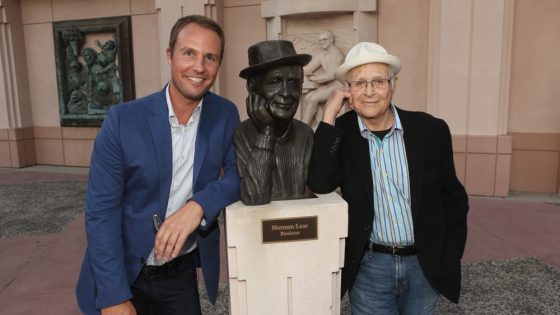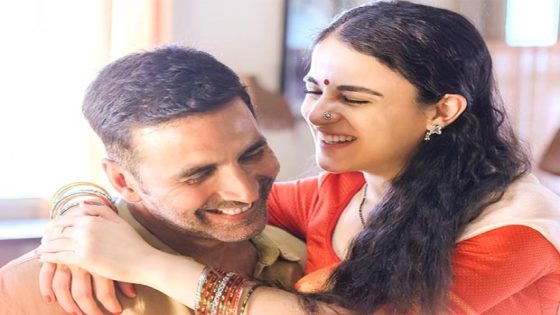Brent Miller first started working for Norman Lear in events, and helped him travel the Declaration of Independence around the country. That eventually led to Miller running Lear’s Act III Prods. company. And under their partnership, the company — based at Sony — roared back in a big way, with the critically acclaimed reboot of “One Day at a Time” and the Emmy-winning “Live in Front of a Studio Audience.” Lear died in December at 101. Here, timed to Lear’s first birthday since his passing (he would have been 102), Miller recounts a specific moment that stands out to him, which says everything you need to know about Lear.
It was a typical sunny morning in Beverly Hills and Norman Lear asked that I come over and enjoy some brunch on the back patio of his home overlooking the pool, prior to driving to our offices on the Sony lot. The menu, at no surprise to me, consisted of hollowed-out bagels, thinly sliced onions, lox, sliced tomatoes, cream cheese and fresh fruit — his favorites. And of course, his newly discovered love of a glass of freshly squeezed tangerine juice.
He marveled over the meal he was eating, appreciating every bite and drank that juice as if he was experiencing holy water delivered straight from God. We talked about our current development slate, our productions, the state of our industry, a touch of politics and his recent obsession for trees.
As we finished the food, he sat back in his chair and wiped his mouth clean, looked at me and said, “Can I say something that may come across the wrong way? I mean, not the wrong way, because it’s not wrong, but it’s a rare thing to say, let alone share with someone.”
This was a common trend. A thought, an idea, a suggestion would suddenly pop into his mind and he’d have to share it. Naturally, I said, “Of course, Norman. Say anything you want.” He paused a second, and then replied with, “I fucking love, and I mean love – because I’m a man who knows how to love – the way we use each other.” He was 99 years old.
Anyone who knew Norman well, especially as it pertains to him wanting to make the world a better place, would inevitably hear him exclaim, “Please use me. Whatever I can do to help. Use me.” In fact, it was 2008 when I first heard those words come from his mouth. We were producing a Fourth of July event on the USS Midway in San Diego on behalf of Declare Yourself (Norman’s nonpartisan youth voter registration organization) and the Declaration of Independence Road Trip Tour. (Yes, Norman owned an original copy of the Declaration of Independence that toured all 50 states prior to him selling it. He felt it was the country’s birth certificate and it should travel to the people, they shouldn’t need to travel to it.).
The event required a vocalist to sing the National Anthem and a few other patriotic songs. “American Idol” was hugely successful at that time and I felt it would be great to have one of the “idols” perform. Unfortunately, the booking agent would not return my calls. After several attempts, I walked into Norman’s office and admitted that I was struggling. He immediately picked up the phone, got the agent on the other end and in no more than three minutes, charmed the hell out of him. He then masterfully indicated to the agent that he was an asshole for not returning the call from his “young associate” — and then wrapped up the conversation by securing that performer for our event. When Norman hung up, he looked at me straight in the eyes and said, “Brent, I work for you, just as you work for me. So please use me.” He was 85 years old.
Those next 16 years, we used each other. In the most caring, loving way possible. He used me to help market and tour his memoir. I used him simultaneously to make a documentary on his life and get him back into television. He used me to help sustain his “comeback.” I used him to help expand our slate and launch my career. In short, I came into his life when he needed a me, and he came into my life when I certainly needed a him. It was serendipity at its finest. It was the best 17 years of my life. And there’s not a day that has gone by since first meeting him that I haven’t felt gratitude and appreciation for the Universe bringing us together.
Throughout the 17 years of our working together, there have been hundreds, if not thousands, of stories that resulted in laughter and tears. Stories reminiscent of various episodes of television that he created through the many characters that we all grew to know and love. But there’s one personal story in particular, an act of selfless kindness by Norman that changed my life forever.
As human beings, we tend to share a desire to please our parents. We want them to accept and appreciate the choices we make and ultimately embrace us for our successes and failures. We want them to be proud of the path we’ve gone down and simply love us for who we’ve become.
I didn’t meet my biological father until I was 17. He had an affair with my mother and chose to stay with his wife and 5 daughters rather than leave the family he had built. I was a secret and he wanted to keep it that way. Even 17 years later, during our first encounter, he made it clear that his family could never know of my existence. My mother never once pursued child support or any sort of joint custody and ultimately honored his request to not be in our lives. Norman couldn’t begin to understand how this man, my biological father, did not wish to be in my life. He’d often ask me if I was going to reach out and take another chance at trying to have a relationship with him. I explained to Norman that I had tried before, but felt it was too difficult to sustain a relationship when he insisted on keeping me a secret. Eventually, his need to keep me a secret hurt more than my desire to have a relationship with him and I needed to move on. Norman understood my feelings and asked if he could write my biological father a letter. I said, “Norman, you can do whatever you want, but keep in mind, his family doesn’t know about me.” A week later I received an email from his assistant. “Brent, I think you’ll want this for your records. Norman sent this via FedEx and I’ve scanned and attached the note, as well as the proof of signature from your father accepting it.” On Norman’s personal letterhead, that note read:
June 18, 2015
Dear Albert Horstman,
I begged your son for this address so that I could thank you for the gift of him on Father’s Day. Brent has been working with me for some nine years now and not a day goes by when I don’t have reason to bless his being there.
You have fathered an altogether attractive, smart as hell, determined and loyal, generous and affirmative, proud and dependable man here, newly turned forty. I am in your debt, Sir, for his being on this planet, let alone in my orbit.
Sincerely,
Norman Lear
I never again had to wonder if my father knew that I had “made it” in life. No longer did I long for any sort of approval or recognition from him. When I see my name scroll through the end credits of a show I’ve produced, I don’t wonder whether or not he has seen it. The heaviest weight I carried for over 40 years of my life was lifted in four sentences that were written by Norman Lear to my father in 2015. The romantic in me wants to believe that Norman’s constant request to be used had somehow found its way into the psyche of my biological father’s thoughts. And in turn, found its way back to Norman. My father, who was never fortunate enough to meet Norman, actually used him to be the role model, mentor, father figure, partner and the friend he never could be.
And Norman Lear, the man who spent 101 years of his life mattering — and caring to do whatever he could with his celebrity to make the world a better place — never met my father. But he understood the value of being used and simultaneously, subconsciously taught me that a win-win is not necessarily transactional, but a philosophy of human interaction which may benefit us all.
Source Agencies


